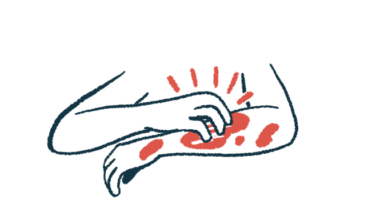Positive Interim Results of Phase 1/2 Trial Support FCX-007 Gene Therapy for RDEB

FCX-007, an experimental gene therapy developed by Fibrocell Science in collaboration with Precigen (a subsidiary of Intrexon), continues to improve wound healing in recessive dystrophic epidermolysis bullosa (RDEB) patients, new results of a Phase 1/2 trial show.
RDEB is caused by mutations in a gene that produces type VII collagen proteins (COL7), a major component of anchoring fibrils that are responsible for binding layers of skin together.
FCX-007 is a gene therapy in development for RDEB based on the patients’ own skin cells, called fibroblasts. After being harvested, the cells are expanded and genetically modified to produce a functional COL7 protein. The cells are then injected back into the patient.
The 52-week trial (NCT02810951), currently recruiting participants with RDEB, was designed to evaluate the safety of FCX-007 administered via injection into the dermis. Additionally, the trial will evaluate how the gene therapy impacts COL7 expression, the presence of anchoring fibrils, and wound healing.
Interim results from the trial were recently presented by M. Peter Marinkovich, MD, the trial’s study director at Stanford University, at the 2018 International Investigative Dermatology meeting, held May 16-19 in Orlando, Florida.
The presentation was titled “A phase 1/2 study of genetically-corrected, collagen VII expressing autologous human dermal fibroblasts injected into the skin of patients with recessive dystrophic epidermolysis bullosa (RDEB).”
In total, four adults ages 20-37 with RDEB, with a total of seven wounds, were given intradermal injections of personalized FCX-007 into the margins of and across targeted wounds. The therapy was also administered into separate intact skin regions.
Three of the four RDEB patients received a single injection of FCX-007 at the beginning of the trial, while one patient received a second injection 25 weeks later at the unhealed wound areas.
Results showed no serious adverse effects, and the therapy was considered safe and well-tolerated up to 52 weeks after the injection.
The analysis, conducted at four weeks and 12 weeks after the FCX-007 injection, showed that 100% (seven out of seven) and 86% (six out of seven) of the wounds, respectively, healed by more than half, relative to the beginning of the trial.
The wound healing continued, reaching 100% at week 52.
Similar wound healing patterns were seen when considering a percentage of more than 75% healing (instead of 50% healing).
Additionally, the results showed that the percentage of untreated wounds (of similar size to the treated wounds) that healed by more than 50% was 14% (one out of seven) by four weeks after the trial’s beginning, 17% (one out of six) at 12 weeks, and no healing thereafter.
“The Phase 1 portion of the trial of FCX-007 continues to be encouraging and reinforces the potential for treating RDEB patients,” Alfred Lane, MD, chief medical adviser of Fibrocell and professor emeritus of dermatology and pediatrics at the Stanford University School of Medicine, said in a press release.
“As we move into Phase 2 of the trial, I am looking forward to incorporating these learnings into the trial and determining the impact on patient outcomes,” Lane added.
In Phase 2 of the trial, six RDEB patients ages 7 and older are expected to be enrolled by the end of the year. FCX-007 will be administered into wounds and the results compared to wounds treated with a control, a sterile saline solution, and to untreated wounds.
Currently one patient has been enrolled in the Phase 2 trial.
“We are pleased with the continued progress of our FCX-007 program that offers promise to be transformative for RDEB patients,” said John Maslowski, president and CEO of Fibrocell.
“Based on safety, pharmacology, and wound healing data, we plan to continue exploring dose range and administration for future patients,” Maslowski added. “We are looking forward to moving ahead with this protocol that advances the clinical trial of FCX-007 and positions us to achieve future milestones for the program.”
FCX-007 was granted U.S. Food and Drug Administration orphan drug, rare pediatric disease, and fast track designations.






